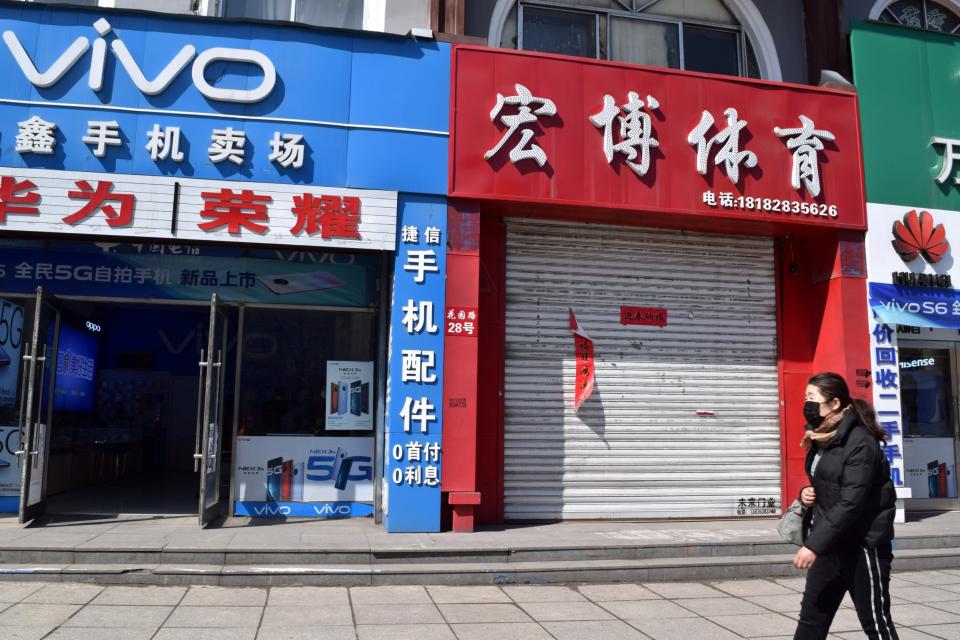Coronavirus: China reports highest number of new infections in weeks
China has reported its highest number of daily coronavirus infections in almost six weeks, largely because of infected people arriving in the country from overseas.
A total of 108 new cases were declared on the mainland by the national health commission on Monday, of which 98 were imported – a new record for such cases, fuelling fears China could experience a second wave of infections brought in from abroad.
With the lockdown now easing in the city of Wuhan, where the Covid-19 outbreak began, Chinese cities and towns near the border with Russia are being seen as the new frontline in the country’s virus response.
Health officials said that of the new cases on Sunday, 49 were Chinese nationals who entered Heilongjiang province from Russia and tested positive.

Border checkpoints are being tightened, and cities near the border are imposing stricter quarantines in response to the influx of patients.
But the news is also sparking a backlash among locals towards their countrymen returning from Russia.
“Our little town here, we thought it was the safest place,” a resident of the border city of Suifenhe, who only gave his surname as Zhu, told Reuters news agency. “Some Chinese citizens, they want to come back, but it’s not very sensible, what are you doing coming here for?”
Suifenhe has become one of the main land routes into China, after Russia stopped commercial flights in March. On 4 April, Moscow extended this to a complete ban on international air traffic – including repatriation flights.
The Chinese border city has now introduced measures similar to those in Wuhan at the height of the crisis in Hubei province. The streets were deserted on Sunday, while all arrivals from abroad are mandated to undergo 28 days of quarantine as well as regular testing.
Separately on Monday, Chinese officials were forced to deny any discrimination against “African brothers” in the country, amid reports authorities in the southern city of Guangzhou have been taking additional anti-virus measures targeting Africans.
Foreign ministry spokesperson Zhao Lijian said at a daily news conference that the accusations were an attempt by the US to harm Beijing’s relations with African nations.
CNN had reported that Africans in Guangzhou were among those feeling the worst impacts of a growing anti-foreigner sentiment across China due to the rising number of imported virus cases.
The American news channel said that in more than two dozen interviews, Africans described being evicted by landlords and refused boarding at hotels, being subject to random testing by officials and required to undergo 14 days’ quarantine – all despite having no symptoms, travel history or contact with known patients.
The US embassy issued a cautionary notice, saying that police in the wider Guangdong province have ordered bars and restaurants not to serve clients who appear to be of African origin.
In a statement, the Chinese foreign ministry said the government had “zero tolerance for discrimination” during the outbreak, but admitted that local authorities in Guangdong were “working promptly to improve their working method”.
Some experts have questioned the number of infections China is declaring as imported, as Beijing seeks to declare victory over an outbreak that began within its borders.
Steve Tsang, director of SOAS university’s China Institute in London, told The Independent that local officials would feel incentivised to get “creative” when reporting the origins of cases, rather than derail the Communist Party narrative that local transmission has been brought down to near zero. “Sometimes, some of the numbers being attributed to foreign travel might not necessarily have been quite as foreign as they might seem,” he said.
Jonathan Eyal, an associate director at the Royal United Services Institute think tank, said China’s low figures for new infections were “slop[ing] out of credulity”.
In Wuhan, where authorities began allowing people to leave the city last week, a major mask manufacturer said it was now focussing entirely on meeting the demand for personal protective equipment in Europe and the US.
Wuhan Zonsen, which makes masks and disinfection wipes, told the Associated Press it had received $50m (£39m) in orders from western countries that will keep them at full production capacity until June.
“Demand now has increased to 10 times [what it was] before because of the epidemic,” said Cynthia Ye, global marketing manager.
On a media tour organised by the Wuhan government, Ye said the company was producing 200,000 masks per day but planned to increase this to 700,000.
Chinese regulators have had to introduce additional checks on exports of PPE after European buyers and countries complained about the quality of testing kits, face masks and other medical equipment rushed out by China in recent weeks. Ye denied there were any quality issues with masks sent by Wuhan Zonsen to the Netherlands, one of a number of European countries to have made criticisms.
Read more
Tracking the coronavirus outbreak around the world in maps and charts
When can we really expect coronavirus to end?
Everything you need to know on supermarket delivery slots
The dirty truth about washing your hands
Listen to the latest episode of The Independent Coronavirus Podcast

 Yahoo News
Yahoo News 
